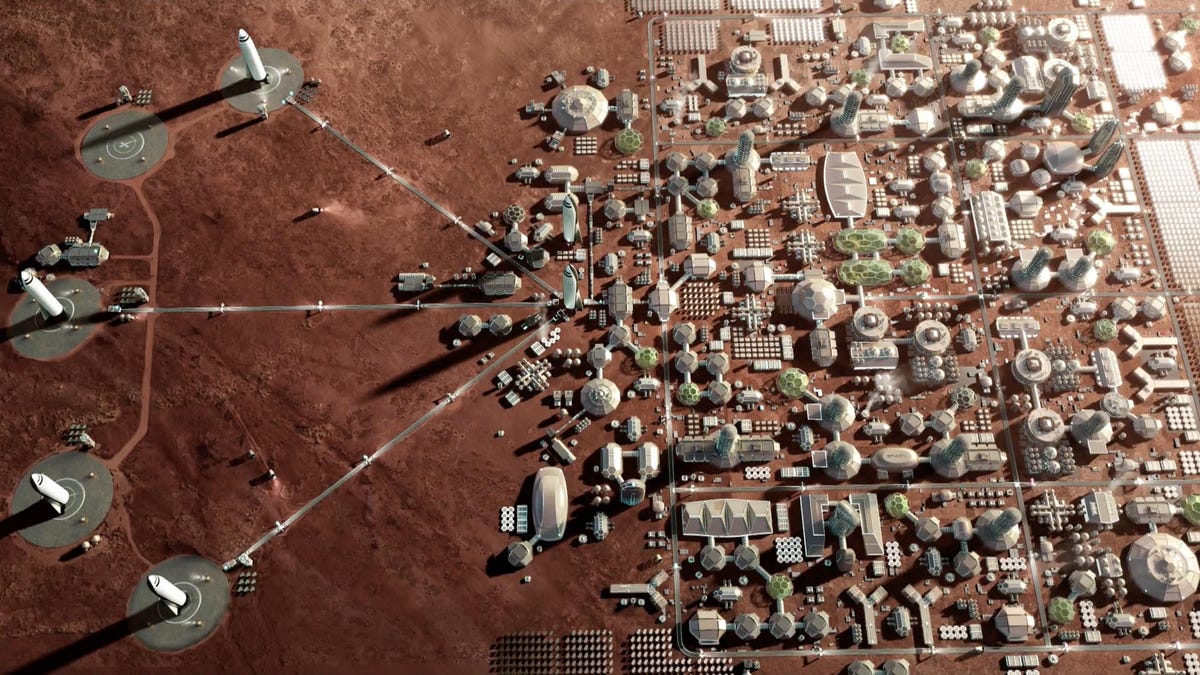 Why You Can Trust CNET
Why You Can Trust CNET Elon Musk: No aliens means more planets for us
New research exploring the Fermi Paradox suggests we may really be alone. All the more reason to go to Mars and beyond, says the SpaceX founder.

Elon Musk just really wants us to get out and see the universe, even if there are no aliens waiting to greet us anywhere.
It's often assumed there must be intelligent life somewhere else in the universe simply because the place if so unfathomably huge. And yet, we've surveyed an awful lot of space with our best technology for decades now without finding any hard evidence of ET. You may have heard of this head-scratching conflict. It's called the Fermi Paradox.
Musk has big plans for the red planet.
A new study takes a fresh look at the famed paradox and the assumption that aliens must be out there somewhere. By being a little more realistic about what we do and don't know about the universe, it finds there's actually a decent chance we're all there is when it comes to intelligence.
"We find a substantial probability that we are alone in our galaxy, and perhaps even in our observable universe," concludes the paper by a team from Oxford University's Future of Humanity Institute published earlier this month.
When he came across this finding, the SpaceX CEO and leading Mars development advocate was not fazed.
"This is why we must preserve the light of consciousness by becoming a spacefaring civilization & extending life to other planets," Musk wrote Sunday on Twitter in response to the research.
It is unknown whether we are the only civilization currently alive in the observable universe, but any chance that we are is added impetus for extending life beyond Earth
— Elon Musk (@elonmusk) June 25, 2018
When the Oxford researchers ran numbers through their model, they found the probability we're the only intelligent civilization in the Milky Way is between 53 and 99.6 percent. The probability we're the only such civilization in the observable universe came in at between 39 and 85 percent.
Musk tweeted that any chance we're truly alone "is added impetus for extending life beyond Earth." He also said, "we are essentially a steward of life & duty-bound... to ensure its continuance."
One of the stated goals of SpaceX is to make humanity a multiplanetary species. The company has already begun work on a massive rocket designed to ferry bold travelers to the moon, Mars and even deeper into the solar system.
Musk has become the face of this new spacefaring movement, but it's certainly not a new notion. Science fiction, as far back as Jules Verne right up through the endless stream of Star Trek spinoffs, has glorified the future SpaceX now hopes to build.
Contemporary planetary scientists like John Lewis of the University of Arizona and Deep Space Industries have also advocated a sort-of Manifest Destiny doctrine when it comes to spreading humanity across the solar system. In his 1997 nonfiction book Mining the Sky, Lewis envisioned mining the natural resources of asteroids and space-based solar power to support a human population up to 100 quadrillion strong spread between Earth and the asteroid belt.
"The most valuable resource in the solar system is human beings," Lewis said at the 2015 New Worlds Conference in Austin. "Imagine what a quadrillion people can achieve."
Another way of stating Musk's line of thinking is that if there really are no aliens, then it's just us and a bunch of huge rocks floating around, so we may as well use them.
Or as Lewis puts it:
"Intelligent life, once liberated by the resources of space, is the greatest resource in the solar system ... the highest fulfillment of life is unbounded intelligence and compassion."
Achieving that fulfillment is also a heck of a lot easier if there's no threat from advanced aliens bent on annihilating us.
Crowd Control: A crowdsourced science fiction novel written by CNET readers.
Solving for XX: The tech industry seeks to overcome outdated ideas about "women in tech."

